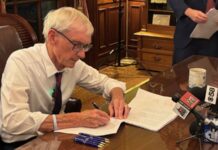Four members of Wisconsin’s House delegation are requesting nearly $150 million in earmarks for ag research, broadband and health care projects.
Both national party caucuses agreed to bring back community project funding. Republicans banned earmarks a decade ago after retaking control of the House with some criticizing the process as wasteful and ripe for corruption. After announcing they would bring back the process, Dems also added several rules to increase transparency.
That includes a cap on how many earmarks each representative can attach to bills and to require lawmakers to make them publicly available. Earmarks are also limited to local governments or nonprofits.
Here is a summary of the amount each member requested, for a total of approximately $148.5 million:
* U.S. Rep. Mark Pocan: $76.0 million
* U.S. Rep. Ron Kind: $47.5 million
* U.S. Rep. Gwen Moore: $24.1 million
* U.S. Rep. Scott Fitzgerald: $930,000
Pocan, D-Town of Vermont, led the pack. He submitted 30 project funding requests totaling more than $76 million.
His biggest request — which was also the biggest one made by any member of the delegation — was a nearly $24 million project at UW-Madison. The money would pay to replace a plant breeding facility and support the USDA’s agricultural research with the school.
Kind, D-La Crosse, came in with nine requests that would cost more than $47 million.
Kind’s most expensive project clocks in at $15.7 million and would fund a Grant County project to install broadband fiber optic cables throughout the county. The project would initially support public safety communications and municipal resources, but it would also increase opportunities to expand broadband access in the area for others in the community later.
Moore, D-Milwaukee, rounded out the Dem group with 10 projects that would cost more than $24 million.
Moore’s biggest project request calls for $1.25 million to add pharmacy services to the Cesar Chavez Health Clinic in her hometown. She also asked for $1 million to hire 56 young disadvantaged workers from the local area to work as part of the Fresh Coast Works Project maintaining existing green space in their neighborhoods.
Wisconsin’s only House Republican to make an earmark request was freshman Fitzgerald, R-Juneau. He asked for $930,000 — the smallest amount overall — to fund two projects.
The biggest ask from Fitzgerald is for $530,000. He wants to spend that money on a new water supply control system for the city of Waukesha to help regulate water pressure. Fitzgerald also wants $400,000 for new laboratory equipment at Children’s Research Institute to further health research in kids at their Wauwatosa lab.
Meanwhile, several of Fitzgerald’s Republican congressional colleagues from Wisconsin have voiced their opposition to earmarks in the past. U.S. Sen. Ron Johnson, R-Oshkosh, said earlier this year he was surprised House Republicans voted to OK earmarks, calling it the wrong way to go.
U.S. Rep Mike Gallagher, R-Allouez, previously told WisPolitics.com he voted against the GOP’s decision to bring earmarks back after their secret vote on the matter saying it would increase pork-barrel spending.
The House Appropriations Committee will eventually vet the hundreds of requests and come up with a final list to include in the budget for 2021-2022.
Listen to the latest Midday podcast for more: https://soundcloud.com/wispolitics/half-of-wisconsins-house






